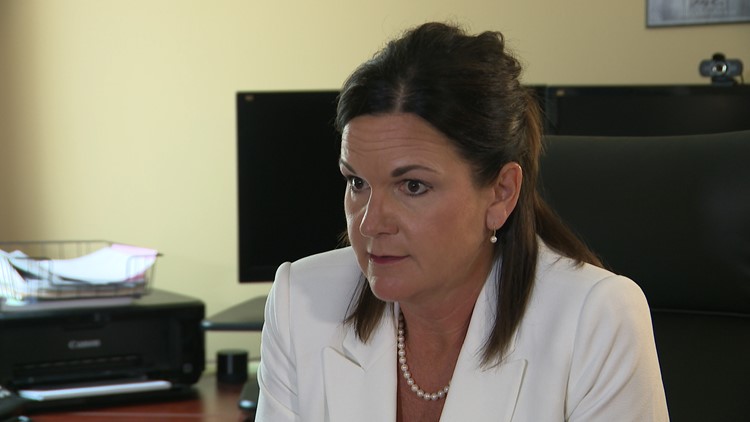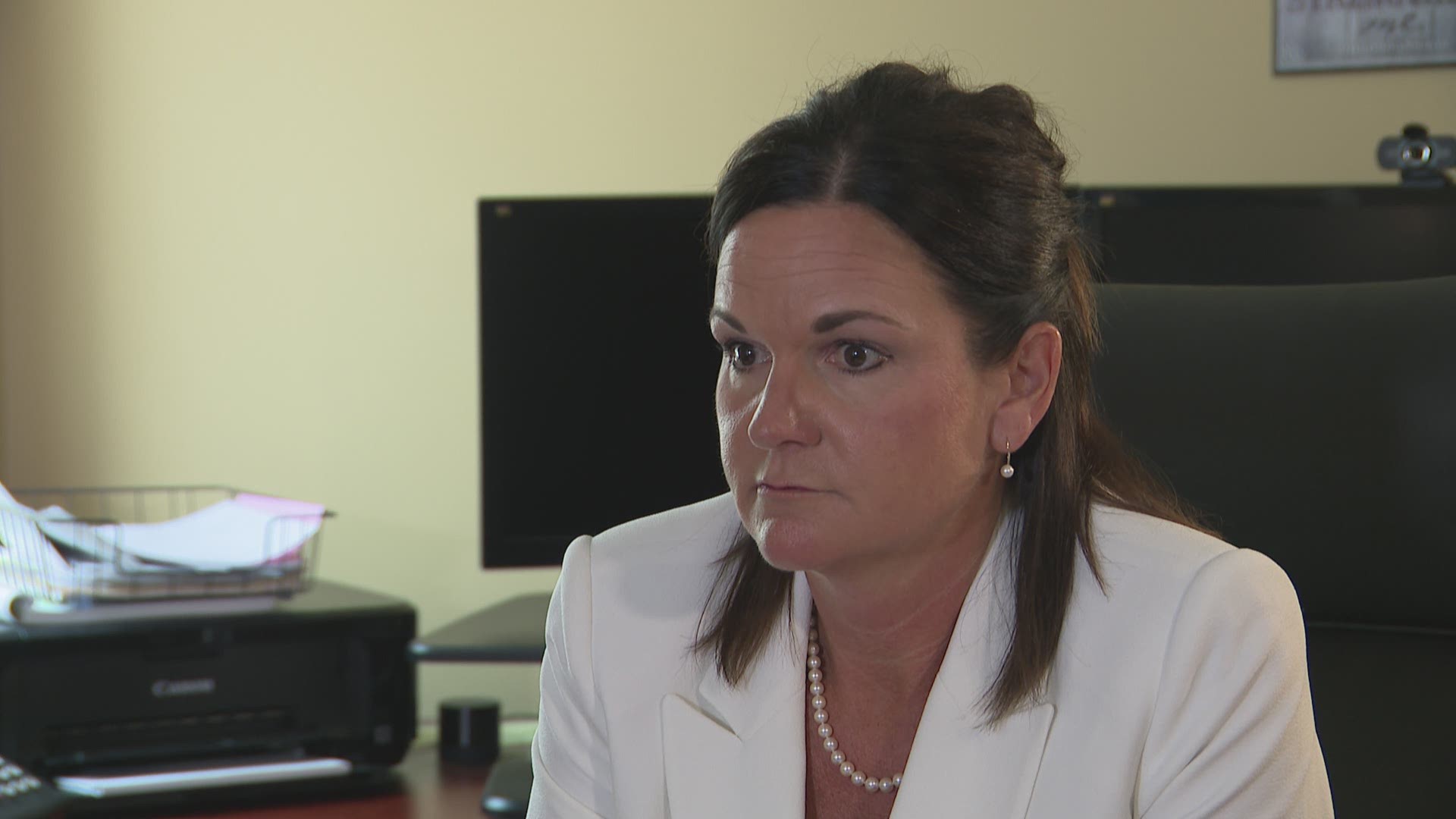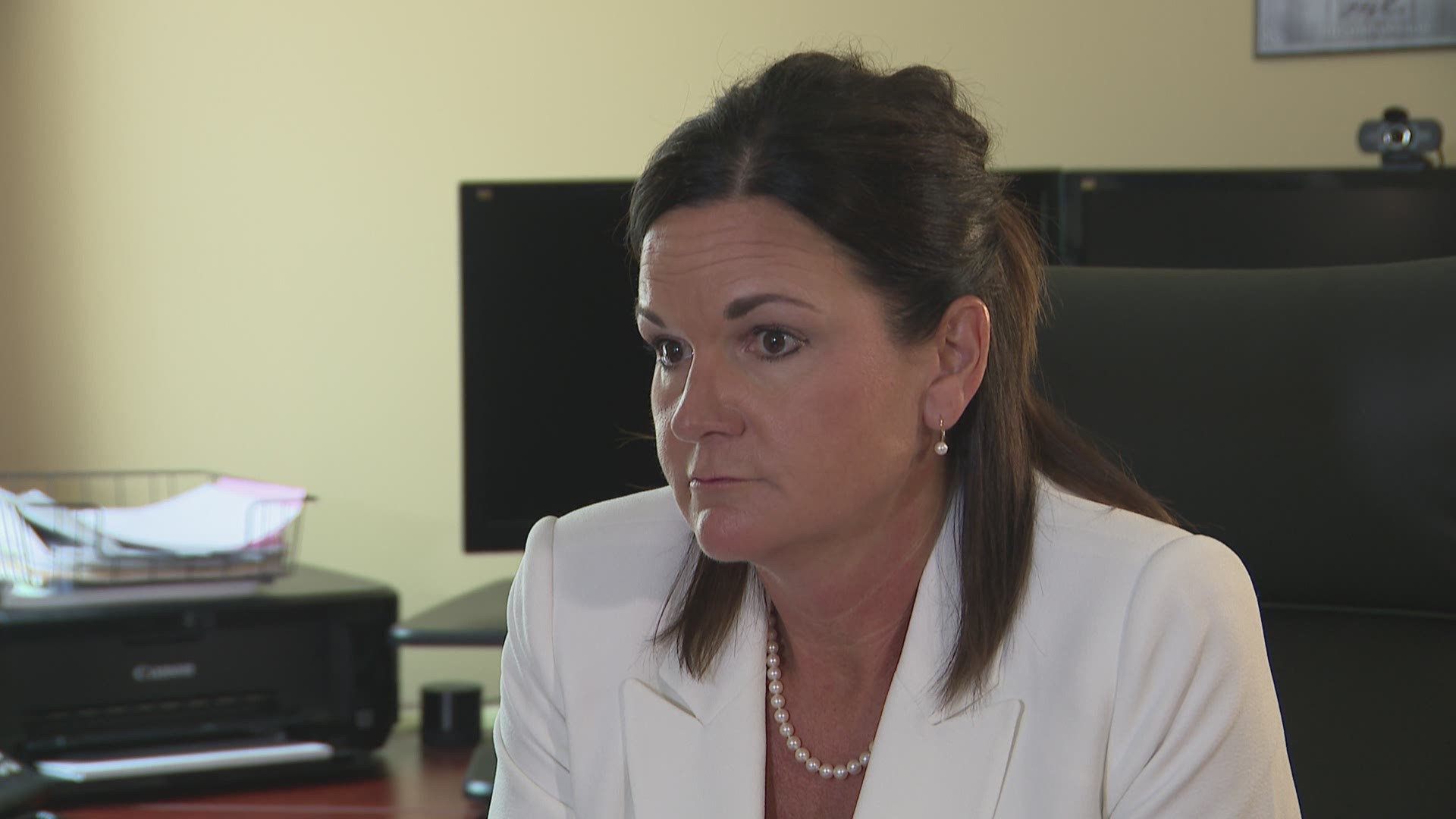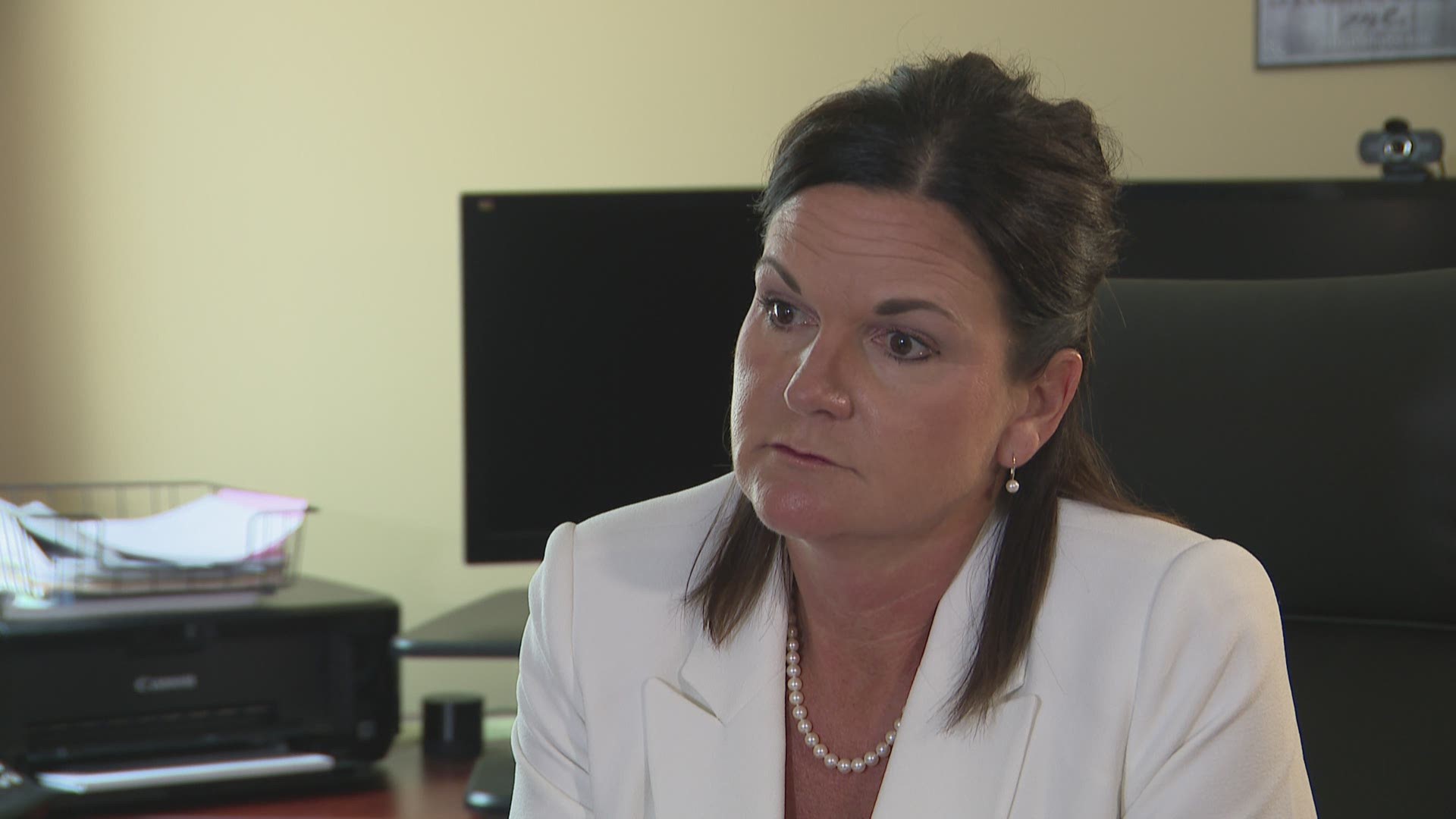TROY, Mo. — Former Lincoln County Prosecutor Leah Chaney says the worst thing that ever happened to her was winning a murder trial against Russ Faria for his wife’s 2011 stabbing death.
It set in motion a decade of public scrutiny, personal and professional allegations of misconduct against her, and now the threat of criminal charges related to how she handled the case, which has since led to an overturned conviction.
Now, a woman named Pam Hupp has been charged with the murder of Betsy Faria. Hupp has already been convicted of killing another man, Louis Gumpenberger — a man who was mentally disabled who Hupp tried to say Russ Faria sent to kidnap her.
The story – including Chaney’s handling of the case – has been the subject of national news coverage, a Dateline special and a movie is now in the making.
But for all this time, Chaney has remained silent – refusing to speak publicly about allegations that she unethically and even illegally prosecuted the case and what led her to so vigorously prosecute Russ Faria despite evidence pointing to Hupp as the killer.
Until now.
“I've never been able to speak and that, I believe, has been by design,” she said.
Chaney says she regrets running for prosecuting attorney
Lincoln County Prosecutor Mike Wood held a news conference July 12, saying he is investigating whether misconduct on the part of police and prosecutors on the case was criminal.
“This was the poorest example of investigative work I or members of my team have ever seen,” Wood said. “It was driven by ego and a prosecutor who was working toward an agenda rather than the truth.”
Wood's words pushed Chaney out of silence.

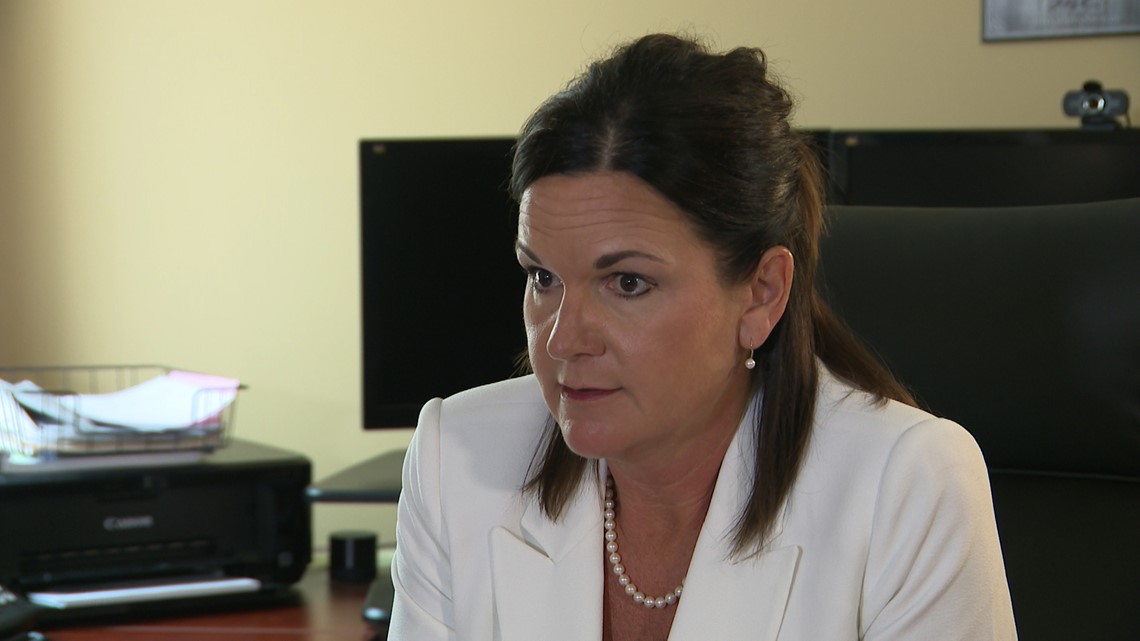
“When I served as a prosecuting attorney, that code of conduct precludes statements from being said to the media,” she explained. “And then thereafter, I was involved in a federal lawsuit for a period of roughly two and a half years.
“And of course, during that time, I was not allowed to answer questions either. And so I kind of was letting it all be behind me, and then after the press conference that Mr. Wood had, I was tired of being silent. I was tired of having my character assassinated and totally being thrown under the bus for some political agenda.”
In a one-hour interview with the I-Team, Chaney vehemently denied withholding evidence from Russ Faria’s attorneys, telling witnesses to lie and doing anything unethical or illegal during the prosecution of the case.
To back it up, she pointed to a pile of bar complaints that have been lodged against her through the years that have not been sustained, a 2017 independent investigation that she called for into her own conduct on the case that found no wrongdoing and her dismissal from Russ Faria’s federal civil rights lawsuit.
“If I am guilty of any of the things they say I have done in this case, then I need to be disbarred,” she said.
Chaney denies withholding evidence from the defense
'I was green'
Chaney is rooted in Lincoln County politics.
Pictures of both of her grandfathers hang in her office.
One features the re-election poster for Warren W. Wommack, a Democratic County Commissioner for the county’s first district.
Chaney was about four years out of law school when she said she and her then-husband thought it would be a good idea for her to run for Lincoln County prosecutor. At the time, she was running against a 20-year incumbent.
“I never expected to win,” she said. “But we thought it would be a good way for me to get my name out there.”
But, she did win.
And less than a year after she took office, Betsy Faria was stabbed 55 times in her home in Troy, Missouri.

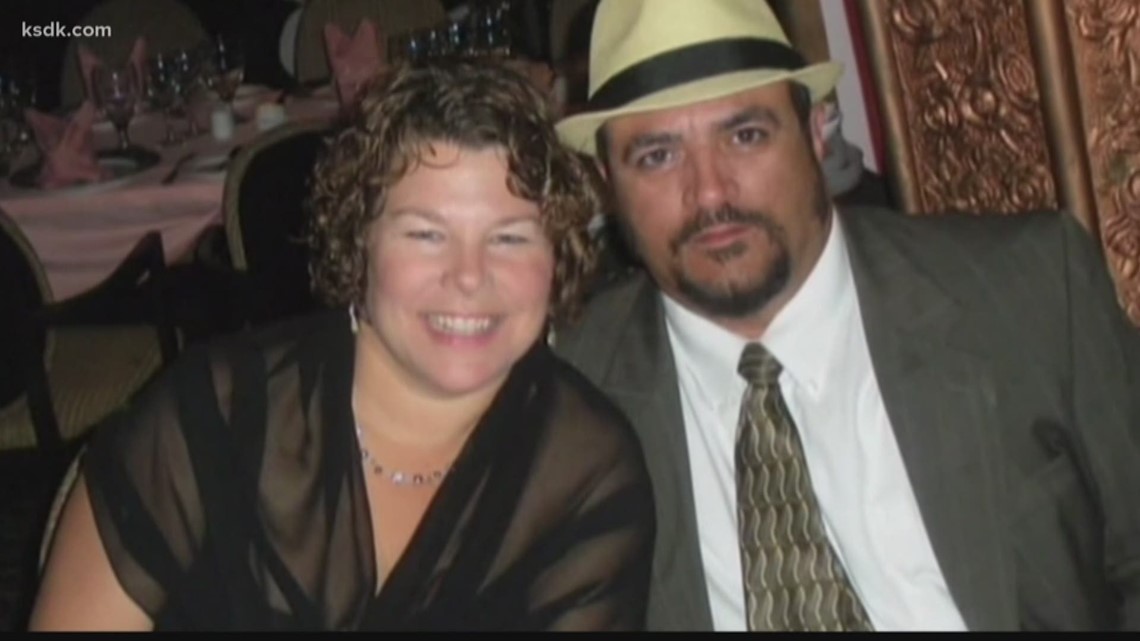
The Lincoln County Sheriff’s Department called in the St. Louis Major Case Squad. It’s a conglomeration of detectives from police departments across the St. Louis area who, when called, send about 20-30 detectives into a jurisdiction for about five days to investigate a murder. At the end of that investigation, they turn their findings over to the agency that called them in.
The only evidence they brought to Chaney pointed to Russ Faria, Chaney said.
She summarized the evidence in the following way:
- Russ Faria was the one who found his wife’s body.
- He called 911 telling dispatchers it was a suicide, even though Betsy Faria had been stabbed 55 times and still had the knife protruding from her neck when paramedics found her. And he called it a suicide for the first few hours after police started questioning him, even though it was apparent to everyone it was not.
- The victim had three life insurance policies, but the only one her husband asked about was the one in which his wife had changed beneficiaries. That beneficiary was Hupp. Betsy Faria put the policy in her name just four days before she was killed, after asking several other friends to serve as beneficiary because she wasn’t on good terms with her husband.
- Chaney said Hupp worked in the insurance industry, so she knew four days – including a weekend – might not be enough time to ensure the policy change had taken effect.
"To me, it's as much of a motive to kill someone to get insurance money as it is to kill someone to preclude insurance money from leaving them," she said.
- Some of Betsy Faria’s stab wounds were so severe that a woman like Hupp wasn’t physically capable of inflicting.
“The Pam Hupp you see today is a lot different than the Pam Hupp we knew then,” Chaney said. “Back then, she walked with a cane.”
Anytime Chaney would question the Major Case Squad detectives, she said she felt dismissed.
“I was told, don’t Nancy Drew it, Leah,” she recalled.
Chaney said she also knew she was in over her head when it came to prosecuting a case like Faria's.
So, she enlisted the help of the Attorney General’s Office, which sent prosecutors to help oversee the case. She said she worked with at least four different attorneys from the Attorney General's Office throughout the first trial.
'I was shocked'
In 2015, the first trial ended in a guilty verdict against Russ Faria.
“I was shocked,” Chaney said. “I knew we had a largely circumstantial case, and they didn’t even go for the second-degree murder charge we had included.”
That’s when she says trouble began.
Russ Faria’s attorney, Joel Schwartz, lodged bar complaints against Chaney accusing her of withholding evidence from him.
Chaney says those complaints weren't sustained.
People began smearing her name in social media, accusing her of framing Russ Faria for his wife’s murder and purposely ignoring evidence that pointed to Hupp.
She went through a divorce.
And Russ Faria won an appeal for a second trial. This time, he waved his right to a jury trial and opted for a bench trial. Judge Steve Ohmar was appointed.
Chaney went back to her files and said she was shocked to find out how much evidence had not been tested or even mentioned in a report including:
- Water droplets in the bathtub, indicating someone had used the shower even though Russ Faria said he hadn’t been home for hours.
- A bath towel, which turned out to have Betsy and Russ Faria’s DNA on it only
- The contents of Betsy Faria’s purse had never been logged
- 12 computers that had never been searched – one of which contained a letter prosecutors believed Betsy Faria wrote saying how she was in fear of her husband.
Chaney said she also called several experts, including an analyst who listened to Russ Faria’s voice on the 911 call as well as an expert who profiled the killer based on the crime scene photos and autopsy findings.
She said both experts told her Russ Faria was the suspect.
'I was devastated'
Going into the second trial, Chaney said she felt even more confident than the first time because of all the evidence she now had.
And again, she had help from the Attorney General’s Office.
But this time, she lost. Russ Faria was freed from prison and exonerated.
“I was devastated,” she said of her feelings at the time. “My grandfather once told me the only thing worse than a guilty person walking the streets is an innocent person going to prison."
Allegations of misconduct within her office continued, on social media and in news reports.
She has an ex-parte order against one man whose wife Chaney once prosecuted for his social media campaign against her.
"They have been relentless," she said.
Russ Faria sued Chaney, the police officers involved in the investigation, as well as the county, in federal court.
In his press conference, Wood didn’t name the prosecutors or police officers he intended to investigate, but said the “allegations in the federal petition for violations of Mr. Faria’s civil rights were largely corroborated by our investigation.”
"They got hit with a $2 million lawsuit and that's not because anybody did a fantastic job," Wood said.
Chaney was a named party in that lawsuit for more than two years, during which she said she provided documentation about all of the decisions she made during the case.
Dozens of people were deposed and asked about her conduct. Ultimately, she was dismissed from the suit, which she says is further evidence of the clean prosecution she ran.
“I was dismissed out of it and found not to have committed the things that they allege that I committed,” she said.
Still, the allegations persisted.
So, she asked the Lincoln County commissioners to launch an independent investigation into her conduct on the case.
“I remember they were like, ‘Are you sure you want to do that?’” she said. “And I said, 'Yes, absolutely, because if I've done any of those things, then you, county commissioners, should have me removed because that's not acceptable.’”
Joe McCulloch served as the special prosecutor on the case and found no wrongdoing.
In 2018, Chaney lost the election to Wood, who vowed in his campaign to reopen the Betsy Faria murder case.
"I loved the job and I did a good job," she said. "I prosecuted thousands of cases and set up all kinds of new programs for our community and did all kinds of things that I really was proud of and enjoyed.
"But the toll that this particular case has taken on myself and on my family and on my friends and frankly, just on our system in general, to me isn't worth it. And if I had it to do again, I absolutely wouldn't do it again."
Order to destroy evidence?
Earlier this year, she was accused of ordering the evidence in the case to be destroyed immediately after Russ Faria’s conviction got overturned.
“That’s just not true,” she said.
She showed the I-Team a copy of a tracking form the Lincoln County Sheriff’s Department sent her office not long after the first trial.
Her secretary signed it, but Chaney said she never saw it. She said it’s a standard form the sheriff’s department issues once a case is closed to say the evidence is ready to be destroyed.
“I never ordered that evidence to be destroyed,” she said. “I wouldn’t, and it never was.”
In his press conference announcing murder charges against Hupp, Wood thanked the St. Charles police department for housing the evidence to ensure it couldn’t be destroyed and said his office discovered the tracking form in question because of a Sunshine request made by the media in February.
Chaney disputes the claim that she ordered the destruction of evidence
Former Lincoln County Sheriff John Cottle was the sheriff at the time his department sent the tracking form to Chaney's office.
"I can guarantee you that Leah, like I, never saw this," he said. "If she had, she would have called me and asked why evidence was sending something over on a murder case to be destroyed."
Cottle, who served as sheriff from 2013 through January, said requests from his department to the prosecutor’s office to destroy evidence were commonplace – except in murder cases like Faria.
“We would send 1,500-1,600 destruction orders in a two-month, three-month period waiting for the prosecutor and a judge to sign it,” he said. “It wasn’t a destruction order, it is a request from the crime scene unit to destroy or get rid of evidence.
“I don’t know why it would go over there. It was a murder case. I don’t know how it ended up over there. They say Leah’s office signed it, but it still has to go before a judge and a judge has to approve it.”
Cottle said he asked the Major Case Squad to review the case and asked St. Charles police to house the evidence.
“(The evidence) was transferred to St. Charles and it had nothing to do with the document found in February of this year,” Cottle said. “I didn’t want the evidence at the Lincoln County Sheriff’s Office because I didn’t want the stigma of us having the evidence while the review was going on so nobody could say the evidence wasn’t turned over."
Wood has also accused previous prosecutors of telling witnesses to lie about the case.
“Information came to my attention from three separate and independent sources that witnesses were asked to lie on the stand by the prosecutor in that case,” he said.
Chaney denies doing so.
“I can tell you that I have never, will never and would never tell a person to lie,” she said.
Cottle said he heard Chaney prepare witnesses for trials in the past, but she didn’t tell them to lie.
“She would never do that,” he said. “There’s trial prep, every attorney does it, they bring witnesses in, bring in questions they expect and tell them to answer what they ask.
“Most people try to elaborate, and she could say, ‘Don’t answer it that way, just answer the question I asked, don’t add anything.’ That’s probably where they’re getting that from.”
Former U.S. Attorney Tom Dittmeier said he, too, doubts Chaney would tell witnesses to lie. He consulted with Chaney during the second trial. He’s now working to get prosecutions on cold cases for the Missouri Attorney General's Office.
“She just seemed very dedicated and I didn’t see anything even close to hiding evidence or anything that would suggest she was trying to like steer it some kind of way,” he said. “She’s been attacked right from the start.
“She knew she needed help on the case, she wanted experts to review the case, even after the first case was reversed, she called me to see if she missed anything. She seemed solid, and she wasn’t afraid to ask for help. I didn’t get the indication she was hiding anything. I would call her a dedicated prosecutor who was trying to do it right.”
Hindsight
Dittmeier said he, too, believed Russ Faria was the suspect.
But that was before the murder of Louis Gumpenberger.
Hupp was convicted of fatally shooting him in 2016. He was a man with developmental disabilities who she claimed Russ Faria sent to kidnap her, so, she killed him in self-defense.
“The evidence that she killed somebody else wasn’t there among all the evidence they are using to charge her with Faria,” Dittmeier said.
Chaney said the Gumpenberger murder was “sloppy” compared to the calculated steps Betsy Faria’s killer went through.
“Had there been information or evidence that she had committed any crime to where she could have been charged and tried, then that may obviously have changed the trajectory thereafter, but the point is, there wasn't any evidence that connected her to the crime,” Chaney said.
Dittmeier agrees.
“I’ve got faith in her and I’ve got faith in everything she did,” he said of Chaney. “She had good intentions.
“There’s no question that she sincerely felt he was guilty and there was evidence there. Twelve people found him guilty the first time. I was just kind of baffled by the overwhelming attacks on her. She tried the case, it was reversed on a court ruling, it had nothing to do with what she did…That happens every day in this country, that doesn’t mean a prosecutor didn’t do a good job, it just means the judge didn’t believe it was proven beyond a reasonable doubt. It doesn’t mean any more than that.”
Chaney is now in private practice, remarried and says she’s still grounded in her faith.
“They have filed multiple bar complaints against me over the course of the last several years,” she said. “They have had the attorney general's office investigate me for what they have alleged have been crimes and criminal conduct.
“They've attempted over and again to have me disbarred. They have alleged that I have done despicable things across the board. And every single time that they have done that, I have been cleared of all of that.”
And, she said, she has no regrets about how she did her job.
“I feel like that everything I did, I did in an effort to make sure that we were going down the right path and to ensure that we were not prosecuting somebody that shouldn't be prosecuted for a crime.”

